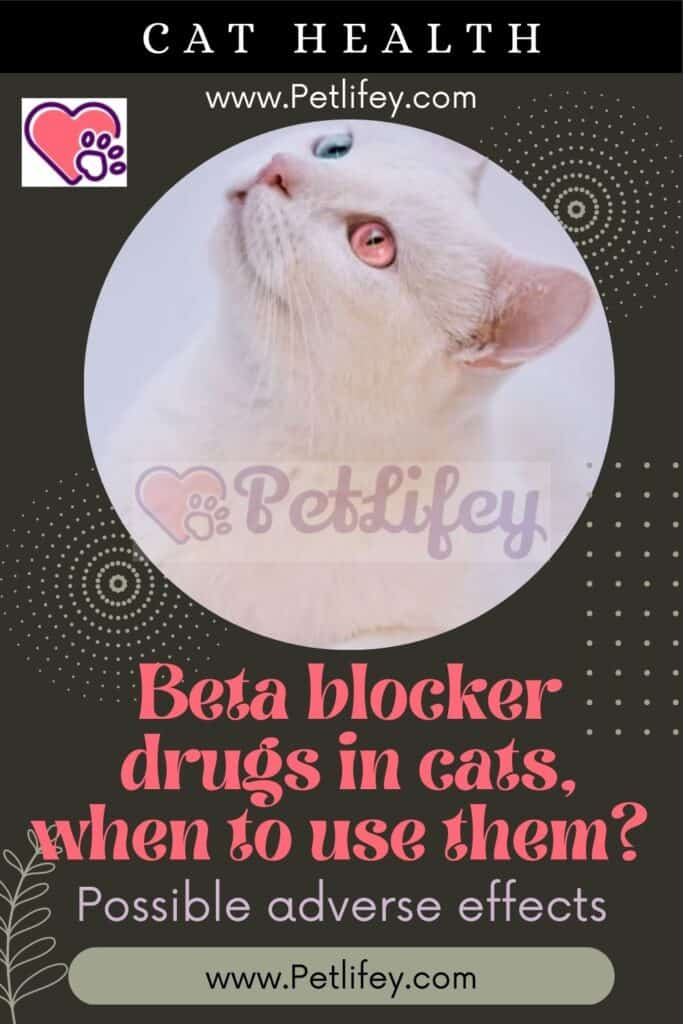The vet may prescribe beta blocker medications for the cat. When should they be used? Possible adverse effects for Kitty.

It may happen that our cat has a health problem and needs to take medications. The vet may prescribe beta blocker medicines for our cat , but what are they? And for which pathology should they be used? It would be useful to know a little more and especially if there can be adverse effects for the cat.
What is a beta blocker?
Inside the organism, both ours and the cat, there are communication mechanisms between the cells that make sure that everything works.
If an imbalance occurs, that’s where, for whatever cause, something starts not working at its best and giving the first signs of the disease.
Before understanding what a beta blocker drug is, it is important to take a step back and see why we say “beta” : only then could we go back to what the drug blocks, when and why.
With the prefix “beta” we refer to that specific molecular structure ( receptor ) located on the surface of the cells: these receive a message from other nerve impulses which, through the receptor, send them the command to execute.
Specifically, beta-receptors serve to transfer the message to the cell when catecholamines are bound to them : they are adrenaline and noradrenaline produced in the cat’s adrenal gland.
Beta receptors are found in the form of:
- Beta 1 receptors : located on the heart muscle and in the kidney. When catecholamines bind to them they cause both an increase in heart rate and strength and in the kidney they stimulate the production of a substance ( renin ) responsible for the increase in blood pressure.
- Beta 2 receptor : found on the smooth muscle surface of the respiratory system, uterus, digestive system and blood vessels, at the level of the pancreas and on some nerve endings. By binding to catecholamines they cause relaxation of the bronchi, increased glycogen breakdown and glucose production, increased heart rate, increased insulin production, tremors.
- Beta 3 receptors : found on the surface of fat cells and their activation causes the release in the blood of fatty acids and glycerol that make up triglycerides.
Beta blocker drugs for cats
Having seen what beta blocking drugs act on, it goes without saying that their action serves to block the effect of catecholamines in the organs on which beta receptors are located.
Most of the time, however, the vet prescribes beta blockers for our cat when it suffers from specific heart conditions.
The clinical condition of our animal is manifested by the action of adrenaline and noradrenaline on the heart muscle: often, however, an overproduction of adrenaline occurs even when the cat is under stress or in a state of danger.
Adrenaline, in fact, is also called the “fight or flight” hormone and is produced by the body when situations arise in which it is necessary to react to save one’s life.
The active ingredients most used for cats are:
- The atenolol : block beta 1 receptors but, at higher doses, it can also block the beta receptors 2. It is used in cats to treat hypertrophic cardiomyopathy, the heart murmur and hypertension due to other diseases such as hyperthyroidism .
- The propranolol : blocks both beta receptors 1 and beta 2 receptors and is used primarily to treat arrhythmias in cats. It is also prescribed in case of hypertrophic cardiomyopathy, arterial hypertension, toxicity due to an excess of thyroid hormones and in case of feline pheochromocytoma. It has also been used against nephropathy in cats.
However, the veterinarian will advise us to periodically check the cat: unfortunately, adverse effects can also occur in our kitty because the drug is indeed a remedy but it can become a poison in some situations.
Recommendations

When our cat takes drugs, we must always follow the veterinarian’s advice to the letter : we must also make sure that there is a correct diet for the Kitty, essential to increase the defences of his organism.
As with everyone, a cat suffering from a disease should live in a quiet and stress-free environment: it would only contribute to worsening its health and would also affect the effect of the drugs.
If, then, it was an elderly cat we must be very careful because it is among those most affected by any adverse effects of beta blockers, including:
- Excessive lowering of blood pressure ;
- Excessive decrease in heart rate ;
- Breathing difficulties due to a constriction of the bronchi ;
- Loss of appetite and diarrhea ;
- Heart failure ;
- Excessive lowering of blood sugar ;
- Problems in pregnancy : these are drugs that cross the placenta and should be prescribed with caution if cat is pregnant ; even if you were breastfeeding you need to consider the administration of beta blockers because they are poured into the milk and therefore would also be taken by puppies.
If your cat suffers from congestive heart failure, the use of beta blockers could be risky. Even if the cat is suffering from diabetes or liver failure, care is advised in administering propranolol to the cat.
The vet will certainly take care to also consider the possible intake of other drugs by our cat: there could be interaction with beta blockers and cause serious consequences to the animal.
The fundamental thing is certainly to strictly respect the dose indicated by the veterinarian: an overdose of beta blockers would cause a sharp drop in blood pressure in the cat to lead to lethargy and coma.
If our cat needs to take these drugs, the vet will certainly know how to follow him to improve his health; we can only not dare to change his indications and pamper our cat.






